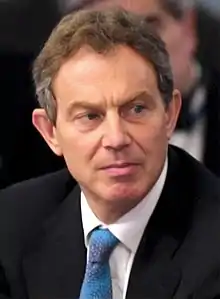2003 United Kingdom local elections
Local elections took place in various parts of the United Kingdom on 1 May 2003, the same day as the Scottish Parliamentary and the Welsh Assembly elections. There were local elections for all councils in Scotland and in most of England. There were no elections in Wales, Northern Ireland or London.
| |||||||||||||||||||||||||||||||||||||||||
All 36 metropolitan boroughs, 40 out of 46 unitary authorities, 232 out of 238 English districts and all 32 Scottish council areas | |||||||||||||||||||||||||||||||||||||||||
|---|---|---|---|---|---|---|---|---|---|---|---|---|---|---|---|---|---|---|---|---|---|---|---|---|---|---|---|---|---|---|---|---|---|---|---|---|---|---|---|---|---|
| |||||||||||||||||||||||||||||||||||||||||
The ruling Labour Party lost a considerable 833 seats, while both the main opposition parties, Conservative and Liberal Democrat, polled strongly, with the Conservatives enjoying the largest share of the vote. Labour had now been in government for six years and still had a triple-digit majority, and over the summer of 2003 some opinion polls showed the Tories level with Labour. However, these were to be the last of the two local council elections contested by the Tories under the leadership of Iain Duncan Smith, who was ousted as leader later in the year and succeeded by Michael Howard due to his unpopularity as leader and doubts about his ability to win a general election.
Fifty-nine councils held electoral pilot schemes to try to boost turnout figures. Schemes included all postal voting, mobile polling stations, alterations to voting hours and various kinds of Electronic voting. The most successful in raising turnout was all-postal voting which saw turnout rise to an average of 50%. In comparison, turnout across the whole of England was only 33%.
Summary of results
The Labour party lost a considerable 833 seats, losing control of councils such as Birmingham and Coventry, both of which the party had controlled for 20 years.
The Conservative party, who following the elections had the most councillors in the country (ahead of Labour by 601), extended its lead over the Labour party by 1,399 councillors. However, their celebrations were tempered by the resignation of Conservative front bencher Crispin Blunt, who described the party leader, Iain Duncan Smith as a "handicap" and called for him to be replaced.[2]
| Party | Councils | Councillors | |||||||
|---|---|---|---|---|---|---|---|---|---|
| Gain | Loss | Change | Total | Gain | Loss | Change | Total | ||
| Conservative | +31 | 110 | +566 | 4,423 | |||||
| Labour | -28 | 66 | -833 | 3,001 | |||||
| Liberal Democrats | +5 | 28 | +193 | 2,624 | |||||
| Independent | -2 | 10 | -42 | 1,142 | |||||
| SNP | -1 | 1 | -21 | 182 | |||||
| Residents | 0 | 2 | 0 | 84 | |||||
| Green | 0 | 0 | +9 | 34 | |||||
| BNP | 0 | 0 | +13 | 13 | |||||
| Liberal | 0 | 0 | -2 | 9 | |||||
| Health Concern | 0 | 0 | -2 | 5 | |||||
| Scottish Socialist | 0 | 0 | -1 | 2 | |||||
| Other | 0 | 0 | 0 | 0 | -24 | 107 | |||
| No overall control | -5 | 123 | — | — | — | — | |||
England
Metropolitan boroughs
All 36 English Metropolitan borough councils had one third of their seats up for election.
Whole council
In 27 English Unitary authorities the whole council was up for election.
‡ New ward boundaries
Third of council
In 13 English Unitary authorities one third of the council was up for election.
| Council | Previous control | Result | Details | ||
|---|---|---|---|---|---|
| Bristol | Labour | No overall control gain | Details | ||
| Derby | Labour | No overall control gain | Details | ||
| Hartlepool | No overall control | No overall control hold | Details | ||
| Kingston upon Hull | No overall control | No overall control hold | Details | ||
| Milton Keynes | Liberal Democrats | Liberal Democrats hold | Details | ||
| Portsmouth | No overall control | No overall control hold | Details | ||
| Reading | Labour | Labour hold | Details | ||
| Slough | Labour | Labour hold | Details | ||
| Southampton | No overall control | No overall control hold | Details | ||
| Southend-on-Sea | Conservative | Conservative hold | Details | ||
| Stoke-on-Trent | No overall control | No overall control hold | Details | ||
| Swindon | No overall control | No overall control hold | Details | ||
| Wokingham | Conservative | Conservative hold | Details | ||
Whole council
In 150 English district authorities the whole council was up for election.
‡ New ward boundaries
Third of council
In 82 English district authorities one third of the council was up for election.
Scotland
All 32 Scottish unitary authorities held elections. They were held at the same time as the 2003 Scottish Parliament election.
References
- http://news.bbc.co.uk/1/hi/uk_politics/2989747.stm
- "Tory leader dismisses leadership threat". BBC News. 2 May 2003. Retrieved 27 June 2016.
- Vote 2003 BBC News
- Local elections 2003. House of Commons Library Research Paper 03/44.
- Voting Pilots in 2003
- The Guardian 2003 election coverage
.JPG.webp)

.jpg.webp)